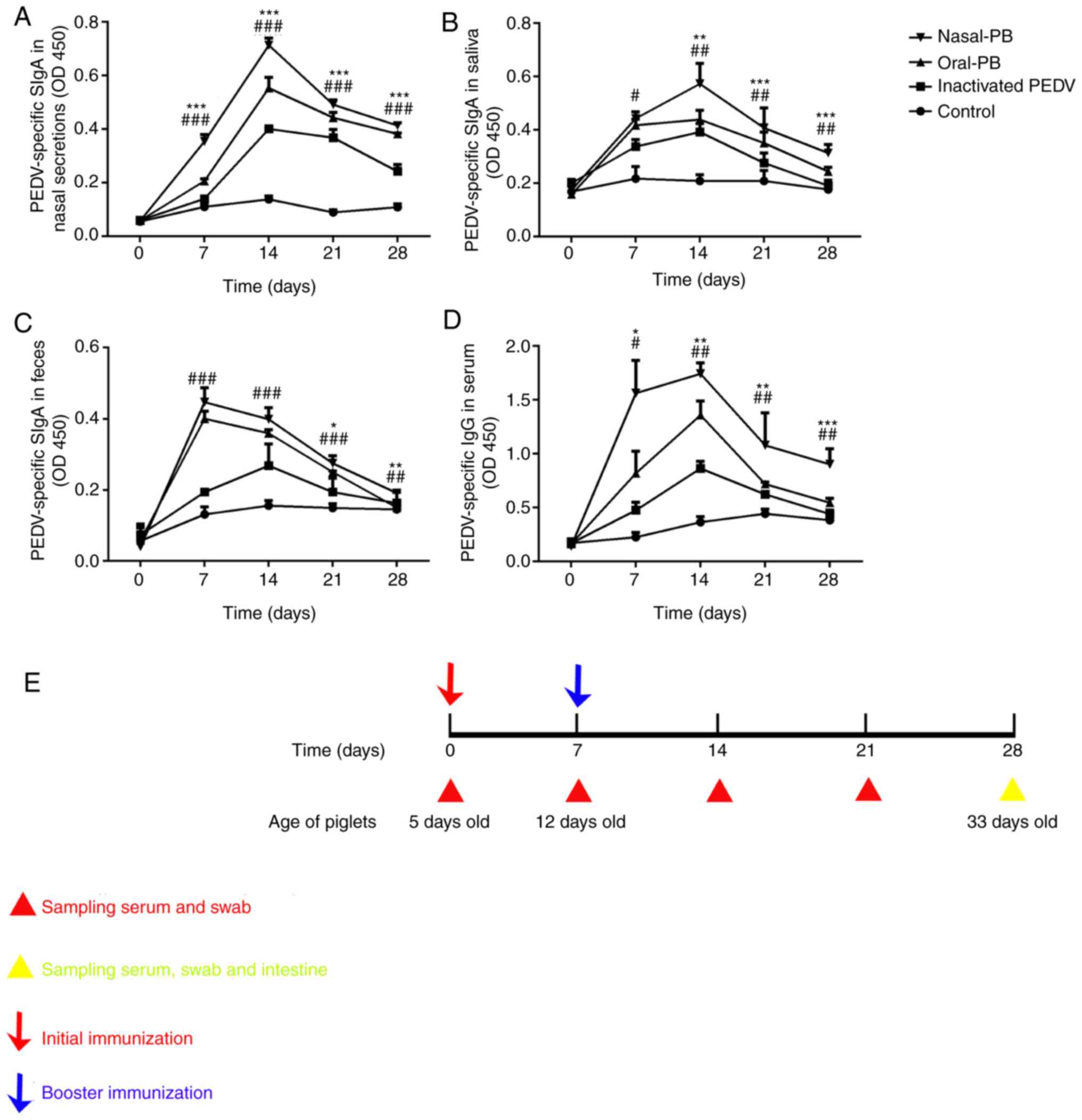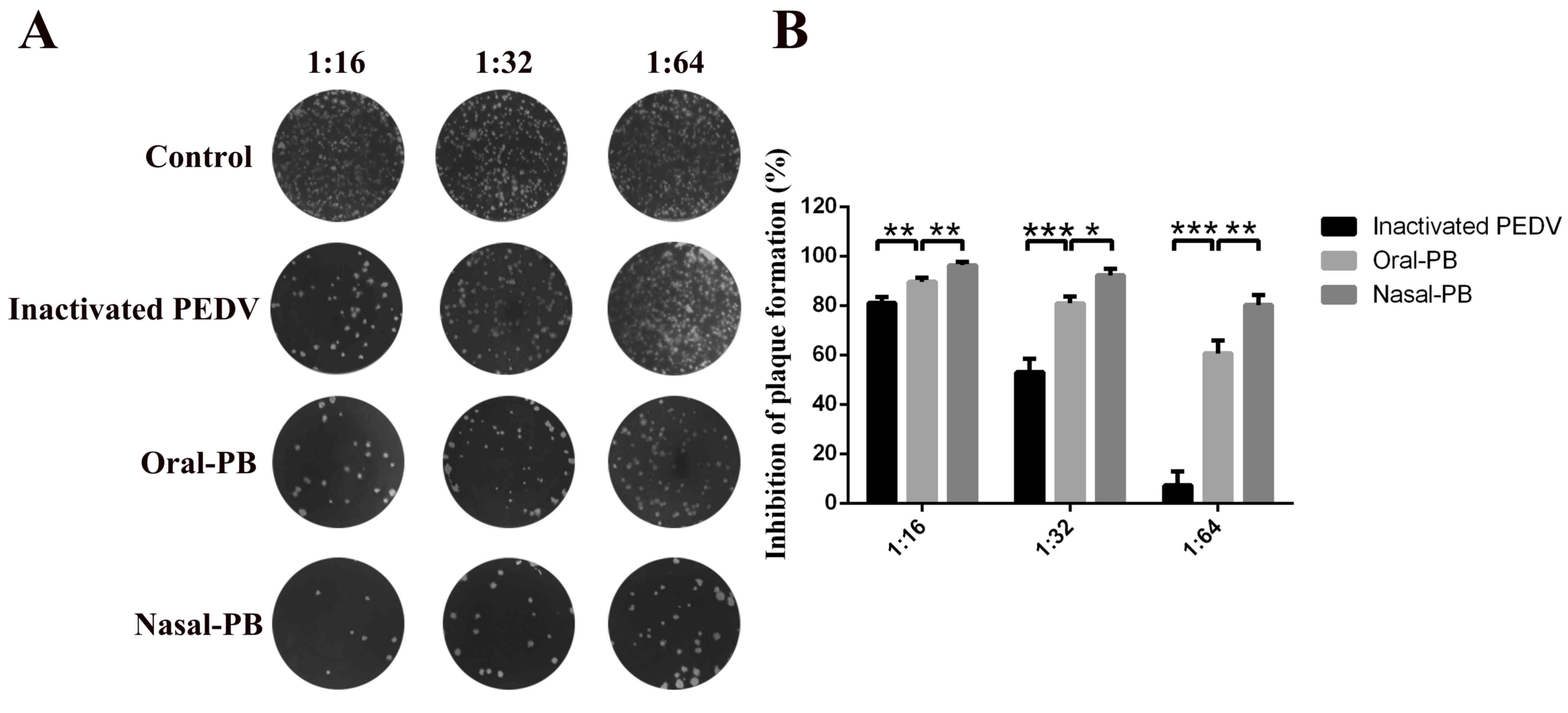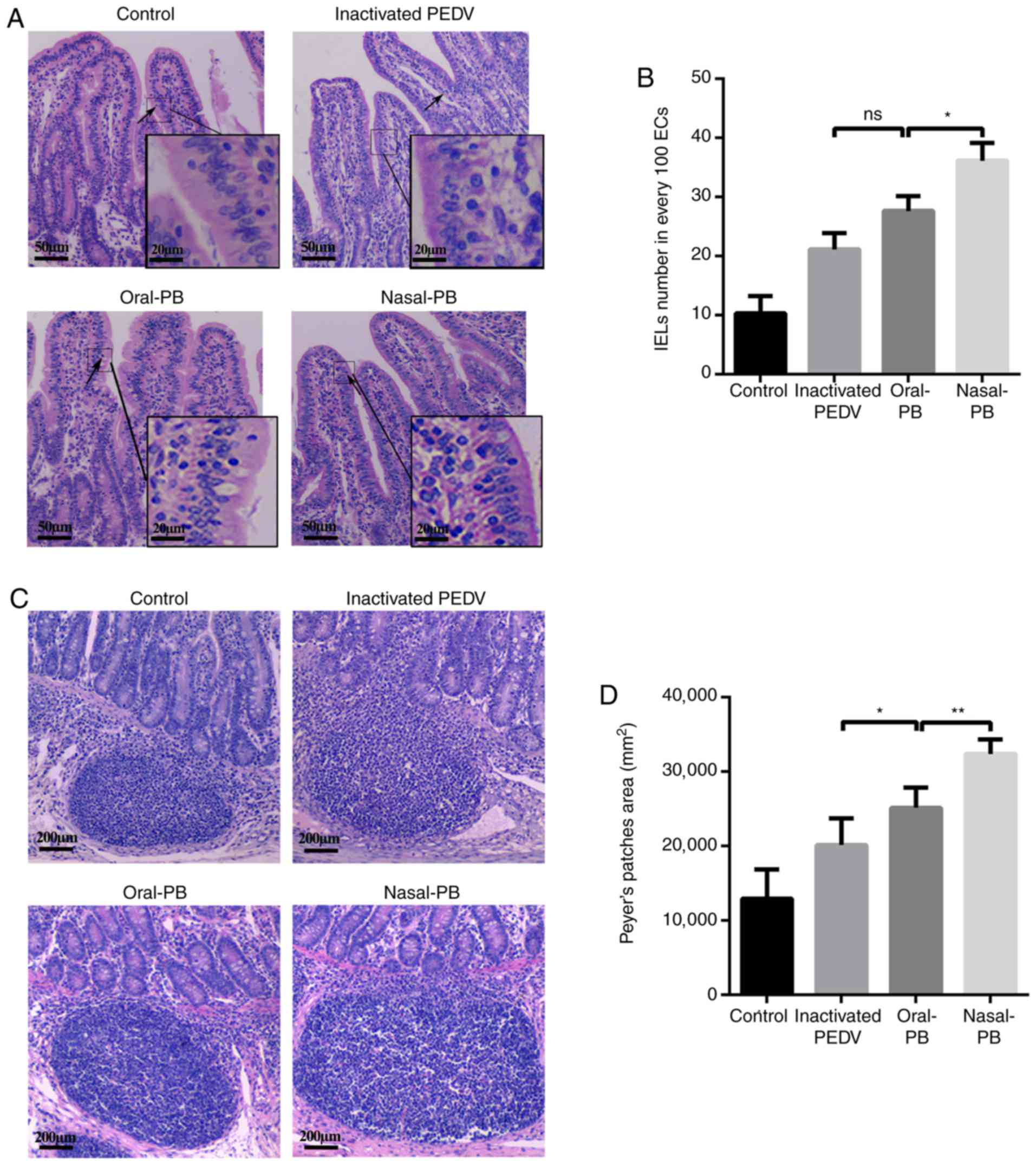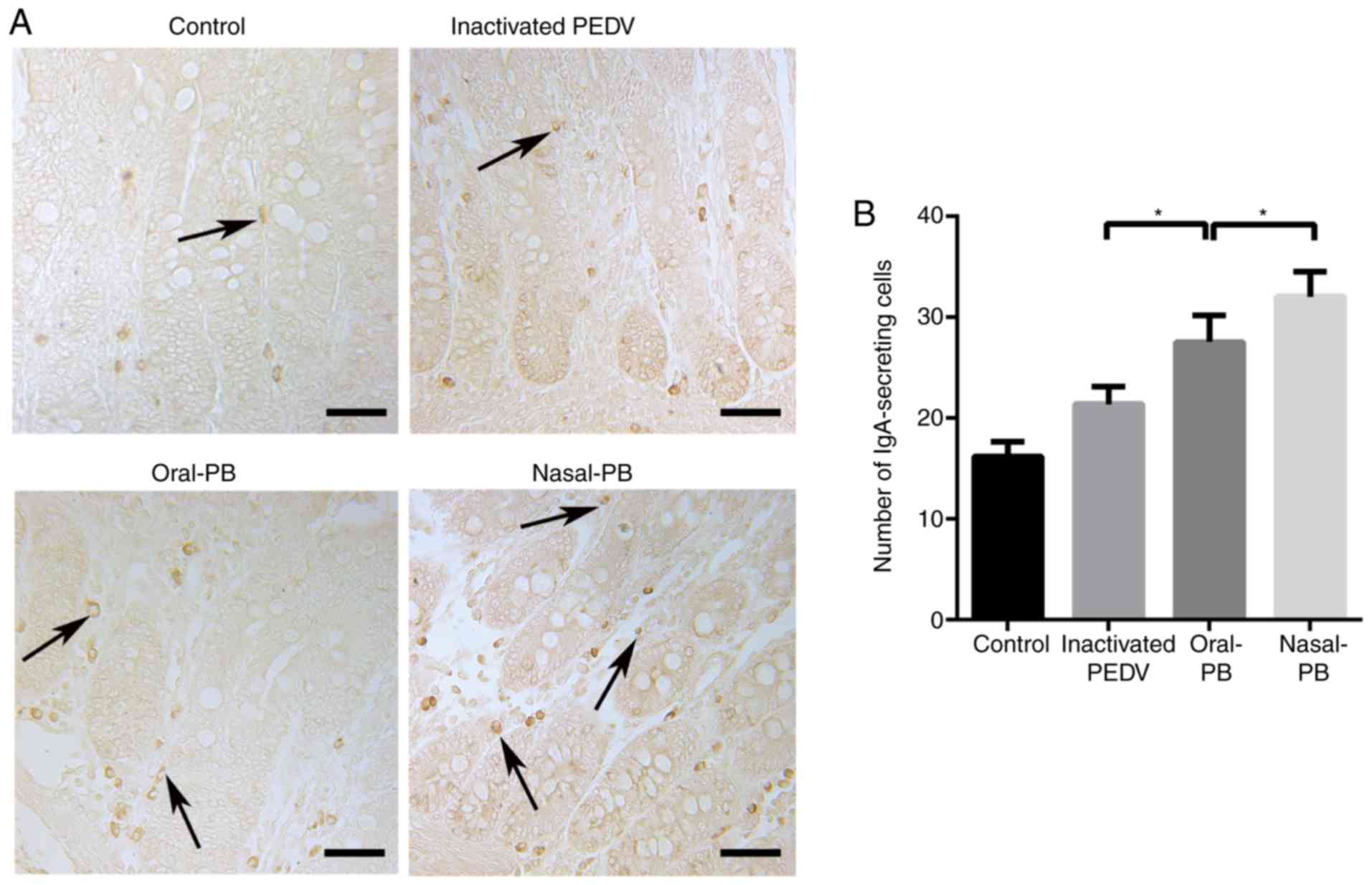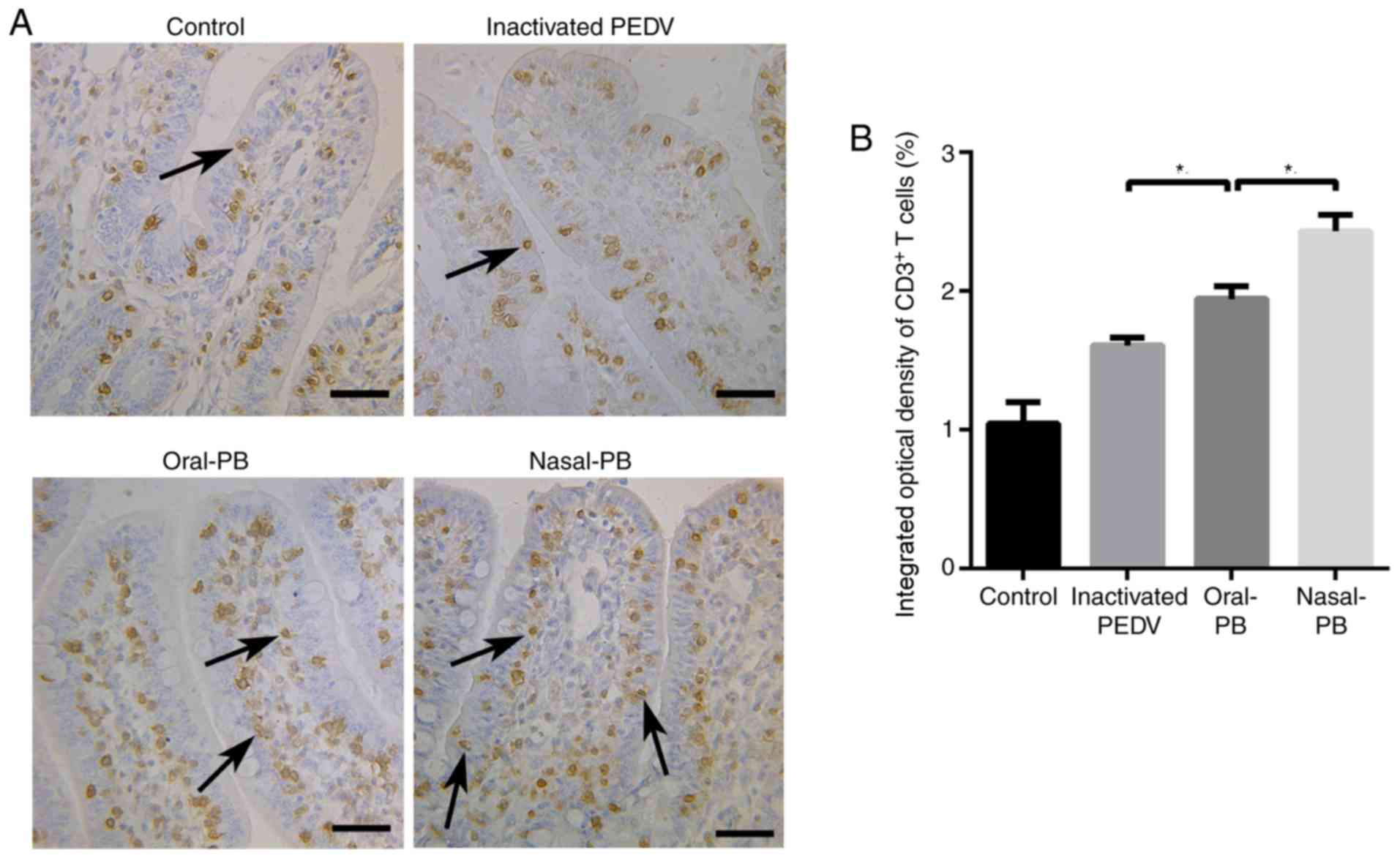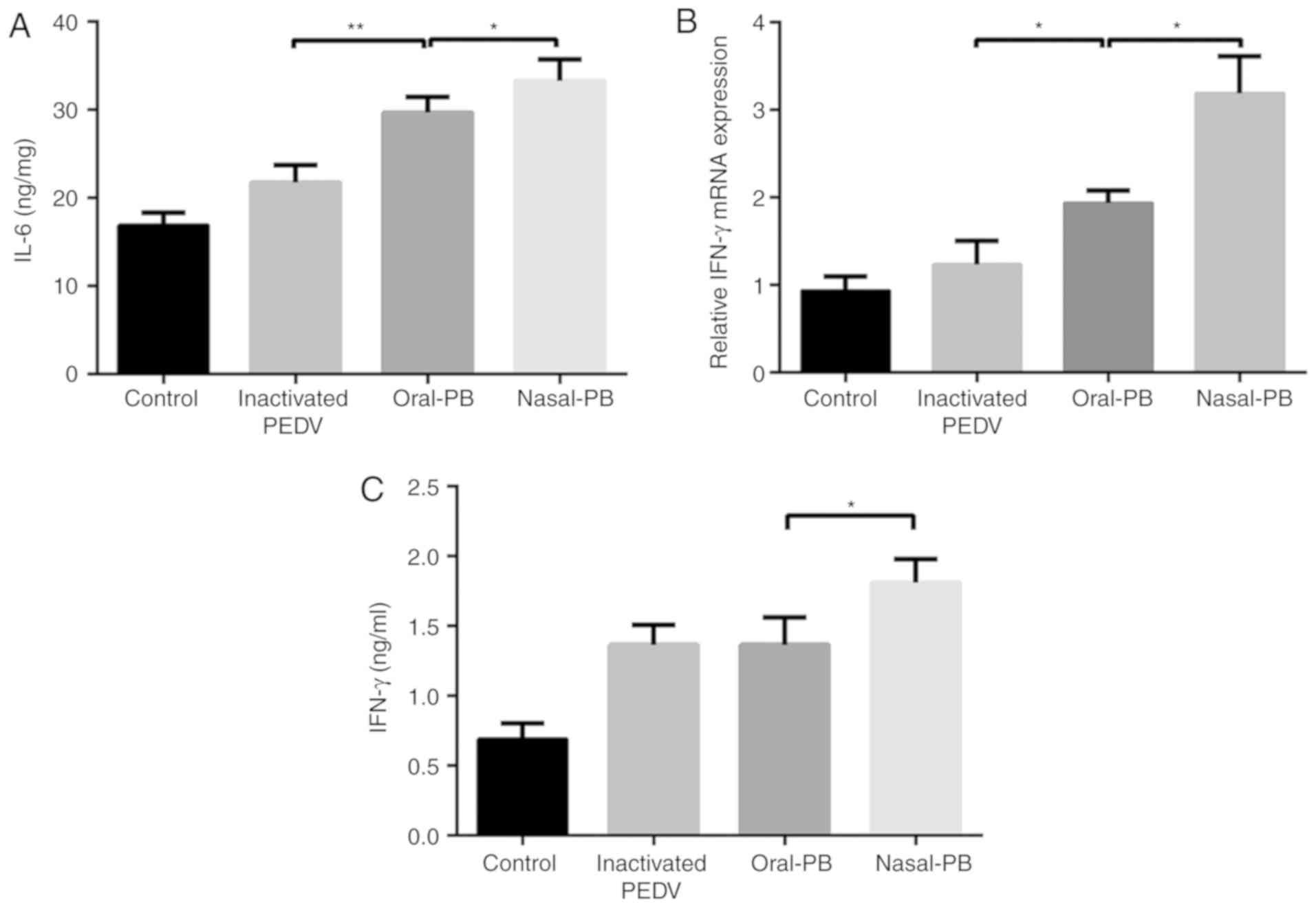|
1
|
Song D, Huang D, Peng Q, Huang T, Chen Y,
Zhang T, Nie X, He H, Wang P, Liu Q and Tang Y: Molecular
characterization and phylogenetic analysis of porcine epidemic
diarrhea viruses associated with outbreaks of severe diarrhea in
piglets in Jiangxi, China 2013. PLoS One.
10(e0120310)2015.PubMed/NCBI View Article : Google Scholar
|
|
2
|
Song D and Park B: Porcine epidemic
diarrhoea virus: A comprehensive review of molecular epidemiology,
diagnosis, and vaccines. Virus Genes. 44:167–175. 2012.PubMed/NCBI View Article : Google Scholar
|
|
3
|
Li W, van Kuppeveld FJM, He Q, Rottier PJM
and Bosch BJ: Cellular entry of the porcine epidemic diarrhea
virus. Virus Res. 226:117–127. 2016.PubMed/NCBI View Article : Google Scholar
|
|
4
|
Hou X, Jiang X, Jiang Y, Tang L, Xu Y,
Qiao X, Min L, Wen C, Ma G and Li Y: Oral immunization against PEDV
with recombinant lactobacillus casei expressing dendritic
cell-targeting peptide fusing COE Protein of PEDV in Piglets.
Viruses. 10(E106)2018.PubMed/NCBI View Article : Google Scholar
|
|
5
|
Wang D, Fang L and Xiao S: Porcine
epidemic diarrhea in China. Virus Res. 226:7–13. 2016.PubMed/NCBI View Article : Google Scholar
|
|
6
|
Mantis NJ and Forbes SJ: Secretory IgA:
Arresting microbial pathogens at epithelial borders. Immunol
Invest. 39:383–406. 2010.PubMed/NCBI View Article : Google Scholar
|
|
7
|
Poles J, Alvarez Y and Hioe CE: Induction
of intestinal immunity by mucosal vaccines as a means of
controlling HIV infection. AIDS Res Hum Retroviruses. 30:1027–1040.
2014.PubMed/NCBI View Article : Google Scholar
|
|
8
|
Wang J, Huang L, Mou C, Zhang E, Wang Y,
Cao Y and Yang Q: Mucosal immune responses induced by oral
administration recombinant Bacillus subtilis expressing the COE
antigen of PEDV in newborn piglets. Biosci Rep.
39(BSR20182028)2019.PubMed/NCBI View Article : Google Scholar
|
|
9
|
Li Y, Wu Q, Huang L, Yuan C, Wang J and
Yang Q: An alternative pathway of enteric PEDV dissemination from
nasal cavity to intestinal mucosa in swine. Nat Commun.
9(3811)2018.PubMed/NCBI View Article : Google Scholar
|
|
10
|
Guy B: Evaluation of events occurring at
mucosal surfaces: Techniques used to collect and analyze mucosal
secretions and cells. Clin Diagn Lab Immunol. 9:753–762.
2002.PubMed/NCBI View Article : Google Scholar
|
|
11
|
Kozlowski PA, Williams SB, Lynch RM,
Flanigan TP, Patterson RR, Cu-Uvin S and Neutra MR: Differential
induction of mucosal and systemic antibody responses in women after
nasal, rectal, or vaginal immunization: Influence of the menstrual
cycle. J Immunol. 169:566–574. 2002.PubMed/NCBI View Article : Google Scholar
|
|
12
|
Staats HF, Montgomery SP and Palker TJ:
Intranasal immunization is superior to vaginal, gastric, or rectal
immunization for the induction of systemic and mucosal anti-HIV
antibody responses. AIDS Res Hum Retroviruses. 13:945–952.
1997.PubMed/NCBI View Article : Google Scholar
|
|
13
|
Lauring AS, Jones JO and Andino R:
Rationalizing the development of live attenuated virus vaccines.
Nat Biotechnol. 28:573–579. 2010.PubMed/NCBI View
Article : Google Scholar
|
|
14
|
Azegami T, Yuki Y and Kiyono H: Challenges
in mucosal vaccines for the control of infectious diseases. Int
Immunol. 26:517–528. 2014.PubMed/NCBI View Article : Google Scholar
|
|
15
|
Amuguni H and Tzipori S: Bacillus
subtilis: A temperature resistant and needle free delivery system
of immunogens. Hum Vaccin Immunother. 8:979–986. 2012.PubMed/NCBI View
Article : Google Scholar
|
|
16
|
Upadhaya SD, Kim SC, Valientes RA and Kim
IH: The effect ofbacillus-based feed additive on growth
performance, nutrient digestibility, fecal gas emission, and pen
cleanup characteristics of growing-finishing pigs. Asian-Australas
J Anim Sci. 28:999–1005. 2015.PubMed/NCBI View Article : Google Scholar
|
|
17
|
Mou C, Zhu L, Xing X, Lin J and Yang Q:
Immune responses induced by recombinant bacillus subtilis
expressing the spike protein of transmissible gastroenteritis virus
in pigs. Antiviral Res. 131:74–84. 2016.PubMed/NCBI View Article : Google Scholar
|
|
18
|
Mou C, Zhu L, Yang J, Xu W, Cheng X and
Yang Q: Immune responses induced by recombinant bacillus subtilis
expressing the hemagglutinin protein of H5N1 in chickens. Sci Rep.
6(38403)2016.PubMed/NCBI View Article : Google Scholar
|
|
19
|
Li Y, Wang G, Wang J, Man K and Yang QJV:
Cell attenuated porcine epidemic diarrhea virus strain Zhejiang08
provides effective immune protection attributed to dendritic cell
stimulation. Vaccine. 35:7033–7041. 2017.PubMed/NCBI View Article : Google Scholar
|
|
20
|
Corazza GR, Frazzoni M and Gasbarrini G:
Jejunal intraepithelial lymphocytes in coeliac disease: Are they
increased or decreased? Gut. 25:158–162. 1984.PubMed/NCBI View Article : Google Scholar
|
|
21
|
Inoue R, Tsukahara T, Nakatani M, Okutani
M, Nishibayashi R, Ogawa S, Harayama T, Nagino T, Hatanaka H,
Fukuta K, et al: Weaning markedly affects transcriptome profiles
and peyer's patch development in piglet ileum. Front Immunol.
6(630)2015.PubMed/NCBI View Article : Google Scholar
|
|
22
|
Ryan KA, Daly P, Li Y, Hooton C and
O'Toole PW: Strain-specific inhibition of helicobacter pylori by
lactobacillus salivarius and other lactobacilli. J Antimicrob
Chemother. 61:831–834. 2008.PubMed/NCBI View Article : Google Scholar
|
|
23
|
Youssef S and Salah M: Differential
expression of CD3, TNF-α, and VEGF induced by olanzapine on the
spleen of adult male albino rats and the possible protective role
of vitamin C. Biomedicines. 7(E39)2019.PubMed/NCBI View Article : Google Scholar
|
|
24
|
Lin J, Tu C, Mou C, Chen X and Yang Q: CpG
DNA facilitate the inactivated transmissible gastroenteritis virus
in enhancing the local and systemic immune response of pigs via
oral administration. Vet Immunol Immunopathol. 172:1–8.
2016.PubMed/NCBI View Article : Google Scholar
|
|
25
|
Livak KJ and Schmittgen TD: Analysis of
relative gene expression data using real-time quantitative PCR and
the 2(-Delta Delta C(T)) method. Methods. 25:402–408.
2001.PubMed/NCBI View Article : Google Scholar
|
|
26
|
Kiyono H and Fukuyama S: NALT- versus
Peyer's-patch-mediated mucosal immunity. Nat Rev Immunol.
4:699–710. 2004.PubMed/NCBI View Article : Google Scholar
|
|
27
|
Sato T, Endoh M, Yoshida H, Yasuo S,
Katsuno T, Saito Y, Isono K and Koseki H: Mammalian Polycomb
complexes are required for Peyer's patch development by regulating
lymphoid cell proliferation. Gene. 379:166–174. 2006.PubMed/NCBI View Article : Google Scholar
|
|
28
|
Lasa-Saracíbar B, Aznar MÁ, Lana H, Aizpún
I, Gil AG and Blanco-Prieto MJ: Lipid nanoparticles protect from
edelfosine toxicity in vivo. Int J Pharm. 474:1–5. 2014.PubMed/NCBI View Article : Google Scholar
|
|
29
|
Kabat AM, Pott J and Maloy KJ: The mucosal
immune system and its regulation by autophagy. Front Immunol.
7(240)2016.PubMed/NCBI View Article : Google Scholar
|
|
30
|
van Wijk F and Cheroutre H: Mucosal T
cells in gut homeostasis and inflammation. Expert Rev Clin Immunol.
6:559–566. 2010.PubMed/NCBI View Article : Google Scholar
|
|
31
|
Wu RQ, Zhang DF, Tu E, Chen QM and Chen W:
The mucosal immune system in the oral cavity-an orchestra of T cell
diversity. Int J Oral Sci. 6:125–132. 2014.PubMed/NCBI View Article : Google Scholar
|
|
32
|
Song D, Moon H and Kang BJ: Porcine
epidemic diarrhea: A review of current epidemiology and available
vaccines. Clin Exp Vaccine Res. 4:166–176. 2015.PubMed/NCBI View Article : Google Scholar
|
|
33
|
O'Neal CM, Clements JD, Estes MK and
Conner ME: Rotavirus 2/6 viruslike particles administered
intranasally with cholera toxin, Escherichia coli heat-labile toxin
(LT), and LT-R192G induce protection from rotavirus challenge. J
Virol. 72:3390–3393. 1998.PubMed/NCBI
|
|
34
|
Van Oirschot JT: Intranasal vaccination of
pigs against Aujeszky's disease: Comparison with one or two doses
of attenuated vaccines in pigs with high maternal antibody titres.
Res Vet Sci. 42:12–16. 1987.PubMed/NCBI
|
|
35
|
Zhang L, Tian X and Zhou F: Intranasal
administration of CpG oligonucleotides induces mucosal and systemic
Type 1 immune responses and adjuvant activity to porcine
reproductive and respiratory syndrome killed virus vaccine in
piglets in vivo. Int Immunopharmacol. 7:1732–1740. 2007.PubMed/NCBI View Article : Google Scholar
|
|
36
|
Schijns VE and Lavelle EC: Trends in
vaccine adjuvants. Expert Rev Vaccines. 10:539–550. 2011.PubMed/NCBI View Article : Google Scholar
|
|
37
|
Blaauboer SM, Mansouri S, Tucker HR, Wang
HL, Gabrielle VD and Jin L: The mucosal adjuvant cyclic di-GMP
enhances antigen uptake and selectively activates
pinocytosis-efficient cells in vivo. Elife 4: 2015.
|
|
38
|
Setlow P: Spores of Bacillus subtilis:
Their resistance to and killing by radiation, heat and chemicals. J
Appl Microbiol. 101:514–525. 2006.PubMed/NCBI View Article : Google Scholar
|
|
39
|
Deng J, Li Y, Zhang J and Yang Q:
Co-administration of Bacillus subtilis RJGP16 and Lactobacillus
salivarius B1 strongly enhances the intestinal mucosal immunity of
piglets. Res Vet Sci. 94:62–68. 2013.PubMed/NCBI View Article : Google Scholar
|
|
40
|
Yang Y, Jing Y, Yang J and Yang Q: Effects
of intranasal administration with Bacillus subtilison immune cells
in the nasal mucosa and tonsils of piglets. Exp Ther Med.
15:5189–5198. 2018.PubMed/NCBI View Article : Google Scholar
|
|
41
|
Jing Y, Liu H, Xu W and Yang Q:
Amelioration of the DSS-induced colitis in mice by pretreatment
with 4,4'-diaponeurosporene-producingBacillus subtilis. Exp Ther
Med. 14:6069–6073. 2017.PubMed/NCBI View Article : Google Scholar
|
|
42
|
Herich RJ: Is the role of IgA in local
immunity completely known? Immunol. 28:1–15. 2016.
|
|
43
|
Mantis NJ, Rol N and Corthésy B: Secretory
IgA's complex roles in immunity and mucosal homeostasis in the gut.
Mucosal Immunol. 4:603–611. 2011.PubMed/NCBI View Article : Google Scholar
|
|
44
|
Holmgren J and Czerkinsky C: Mucosal
immunity and vaccines. Nat Med. 11 (4 Suppl):S45–S53.
2005.PubMed/NCBI View
Article : Google Scholar
|
|
45
|
Neutra MR and Kozlowski PA: Mucosal
vaccines: The promise and the challenge. Nat Rev Immunol.
6:148–158. 2006.PubMed/NCBI View Article : Google Scholar
|
|
46
|
Mcghee JR, Fujihashi K, Beagley KW and
Kiyono HJ: Role of interleukin-6 in human and mouse mucosal IgA
plasma cell responses. Immunol Res. 10:418–422. 1991.PubMed/NCBI View Article : Google Scholar
|
|
47
|
Libbey JE and Fujinami RS: Adaptive immune
response to viral infections in the central nervous system. Handb
Clin Neurol. 123:225–247. 2014.PubMed/NCBI View Article : Google Scholar
|
|
48
|
Hershberg R and Blumberg RS: The
lymphocyte-epithelial-bacterial interface. Springer US, 2003.
|
|
49
|
Li Z, Zhang C, Zhou Z, Zhang J, Zhang J
and Tian Z: Small intestinal intraepithelial lymphocytes expressing
CD8 and T cell receptor γδ are involved in bacterial clearance
during Salmonella enterica serovar Typhimurium infection. Infect
Immun. 80:565–574. 2012.PubMed/NCBI View Article : Google Scholar
|
|
50
|
Dharakul T, Rott L and Greenberg HB:
Recovery from chronic rotavirus infection in mice with severe
combined immunodeficiency: Virus clearance mediated by adoptive
transfer of immune CD8+ T lymphocytes. J Virol. 64:4375–4382.
1990.PubMed/NCBI
|
|
51
|
Vazquez MI, Catalan-Dibene J and Zlotnik
AJC: B cells responses and cytokine production are regulated by
their immune microenvironment. Cytokine. 74:318–326.
2015.PubMed/NCBI View Article : Google Scholar
|
|
52
|
Onyiah JC and Colgan SP: Cytokine
responses and epithelial function in the intestinal mucosa. Cell
Mol Life Sci. 73:4203–4212. 2016.PubMed/NCBI View Article : Google Scholar
|
|
53
|
Steidler L, Robinson K, Chamberlain L,
Schofield KM, Remaut E, Le Page RW and Wells JM: Mucosal delivery
of murine interleukin-2 (IL-2) and IL-6 by recombinant strains of
Lactococcus lactis coexpressing antigen and cytokine. Infect Immun.
66:3183–3189. 1998.PubMed/NCBI
|
|
54
|
Weiss ID, Wald O, Wald H, Beider K,
Abraham M, Galun E, Nagler A and Peled A: IFN-gamma treatment at
early stages of influenza virus infection protects mice from death
in a NK cell-dependent manner. J Interferon Cytokine Res.
30:439–449. 2010.PubMed/NCBI View Article : Google Scholar
|
|
55
|
Kak G, Raza M and Tiwari BK:
Interferon-gamma (IFN-γ): Exploring its implications in infectious
diseases. Biomol Concepts. 9:64–79. 2018.PubMed/NCBI View Article : Google Scholar
|
|
56
|
Djupesland PG: Nasal drug delivery
devices: Characteristics and performance in a clinical
perspective-a review. Drug Deliv Transl Res. 3:42–62.
2013.PubMed/NCBI View Article : Google Scholar
|
|
57
|
El-Kattan A, Hurst S, Brodfuehrer J and
Loi CM: Anatomical and physiological factors affecting oral drug
bioavailability in rats, dogs, and humans. John Wiley & Sons,
Inc., 2011.
|
|
58
|
Yen HH, Scheerlinck JP, Gekas S and Sutton
P: A sheep cannulation model for evaluation of nasal vaccine
delivery. Methods. 38:117–123. 2006.PubMed/NCBI View Article : Google Scholar
|















